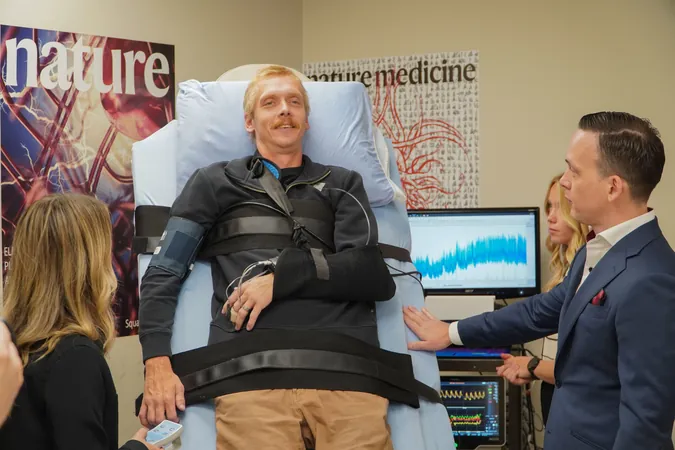
Revolutionary Implant Transforms Lives of Spinal Cord Injury Patients by Stabilizing Blood Pressure
2025-09-17
Author: Nur
Imagine waking up without the fear of fainting just by getting out of bed. For 32-year-old Cody Krebs, this is now a reality thanks to groundbreaking research in spinal cord injury (SCI) treatment. After a devastating motor vehicle accident in 2022 left him paralyzed and reliant on a wheelchair, Krebs faced the terrifying unpredictability of blood pressure drops and spikes, exposing him to severe health risks.
Thanks to a pioneering international clinical trial involving experts from the University of Calgary, École Polytechnique Fédérale de Lausanne (EPFL), the University of Lausanne (UNIL) in Switzerland, and Sint Maartenskliniek in the Netherlands, patients like Krebs are regaining control over their bodies.
Krebs recalls his struggle: "Before the accident, I had no idea how volatile blood pressure can be. Just moving from my bed to my wheelchair often made me feel like I was about to pass out." With cutting-edge technology at the forefront of research, Krebs is now part of a revolutionary treatment that stabilizes blood pressure after SCI.
Recent studies published in top-tier journals like Nature and Nature Medicine report on this breakthrough. Led by Dr. Aaron Phillips and a team of distinguished researchers, the therapy involves implanting a unique neurostimulation device along the spine, complete with advanced electrodes and a pulse generator that delivers precisely calibrated electrical stimulation. This innovative system, much like a cardiac pacemaker, adapts to individual needs and can be controlled via an app.
Dr. Phillips states, "Our findings were pivotal in bridging the gap from basic science to clinical applications. This collaboration enabled us to deliver clinical therapies at an unprecedented pace." The clinical trials have shown that, within minutes of activation, blood pressure can be returned to a safer range.
Moreover, the studies highlighted the critical need to address the serious medical implications of low blood pressure after SCI, which can lead to exhaustion and heightened cardiovascular risks. By employing neuromodulation therapy, patients can effectively manage not only their low blood pressure but also curb dangerous spikes.
Dr. Grégoire Courtine, another key researcher, elaborates: "Our studies have mapped the neuronal pathways responsible for dangerous blood pressure elevation. This innovative stimulation competes with those pathways to provide much-needed regulation." The encouraging results have been consistent across different clinical sites, showcasing the therapy's global applicability.
Following successful surgeries conducted by renowned neurosurgeon Dr. Erkan Kurt in the Netherlands, many participants like Krebs reported significant improvements, such as increased energy, better cognitive function, and reduced risk of blood pressure spikes. Dr. Ilse van Nes, involved in the deployment of the device, emphasizes its ease of use in everyday environments.
The safety profile of these implanted devices is robust, as they've been used widely in treating various pain conditions. Dr. Fady Girgis points out the swift improvements seen post-implantation, successfully enhancing life quality for patients.
Krebs expresses his gratitude and optimism: "It’s empowering to manage my blood pressure now. I feel alert, energetic, and much safer. I truly appreciate the ongoing research that makes this possible."
The implantable neurostimulation system was developed by ONWARD Medical, which has recently received FDA approval to launch a pivotal trial involving top neurorehabilitation centers across North America and Europe. This therapy represents a major leap forward for the SCI community, ushering in a new era of hope.



 Brasil (PT)
Brasil (PT)
 Canada (EN)
Canada (EN)
 Chile (ES)
Chile (ES)
 Česko (CS)
Česko (CS)
 대한민국 (KO)
대한민국 (KO)
 España (ES)
España (ES)
 France (FR)
France (FR)
 Hong Kong (EN)
Hong Kong (EN)
 Italia (IT)
Italia (IT)
 日本 (JA)
日本 (JA)
 Magyarország (HU)
Magyarország (HU)
 Norge (NO)
Norge (NO)
 Polska (PL)
Polska (PL)
 Schweiz (DE)
Schweiz (DE)
 Singapore (EN)
Singapore (EN)
 Sverige (SV)
Sverige (SV)
 Suomi (FI)
Suomi (FI)
 Türkiye (TR)
Türkiye (TR)
 الإمارات العربية المتحدة (AR)
الإمارات العربية المتحدة (AR)